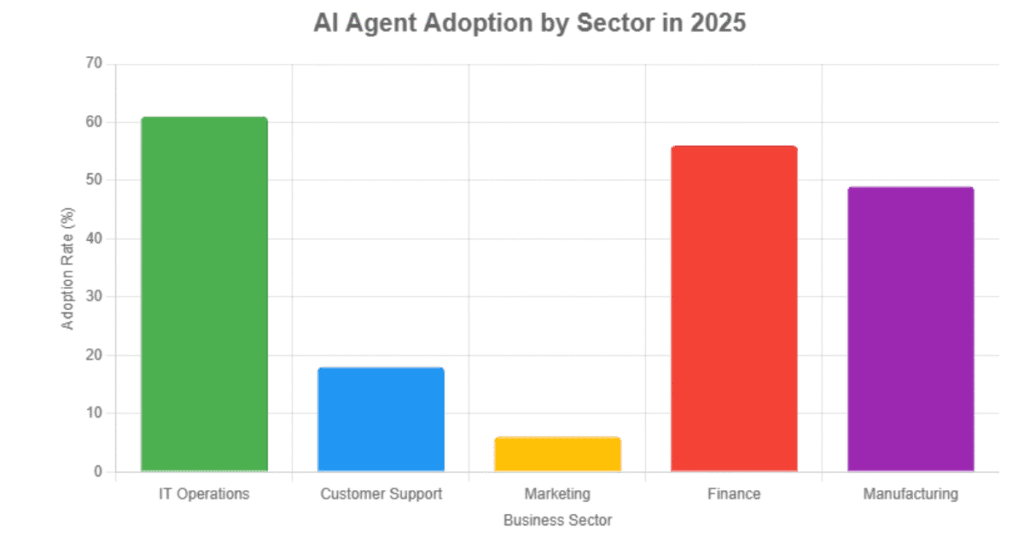Imagine a world where your business runs like a well-oiled machine, not because of endless meetings or manual tweaks, but thanks to intelligent digital helpers that anticipate needs, automate tasks, and make decisions on the fly. That’s the promise of AI agents in business operations—a technology that’s rapidly evolving from sci-fi concept to everyday reality. As we step into 2025, AI agents are set to transform how companies operate, boosting efficiency, cutting costs, and unlocking new levels of innovation. But what exactly are these agents, and how will they shape the future of business?
In this comprehensive guide, we’ll dive deep into the future of AI agents in business operations. We’ll explore their current state, emerging trends, impacts across various sectors, benefits, challenges, and practical steps for integration. Whether you’re a CEO eyeing competitive edges or a manager curious about workflow improvements, this article will equip you with insights to navigate this exciting frontier. Let’s break it down step by step, making it easy to follow and apply to your own operations.
What Are AI Agents? A Simple Breakdown
Before we look ahead, let’s clarify what AI agents really are. Unlike traditional AI tools that respond to prompts—like chatbots generating text—AI agents are autonomous systems powered by large language models (LLMs). They can plan, act, learn from experiences, and even collaborate with other agents or humans. Think of them as digital employees: proactive, adaptable, and capable of handling complex, multi-step processes without constant supervision.
For instance, an AI agent might monitor inventory levels, predict shortages based on sales data, place orders with suppliers, and update your team’s dashboard—all in real-time. They’re built on advanced AI frameworks that allow for “agentic” behavior, meaning they have goals, tools, and the ability to reason through tasks. In 2025, these agents are becoming more sophisticated, integrating with enterprise systems for seamless operations.
Why does this matter for business? In a fast-paced world, where decisions need to be made instantly, AI agents bridge the gap between data overload and actionable insights. They’re not just tools; they’re partners in optimizing everything from supply chains to customer service.
The Current Landscape of AI Agents in Business
As of 2025, AI agents are already making waves in business operations, though adoption is still in its growth phase. According to recent reports, 78% of organizations have started implementing AI agents in the last two years, with 85% adopting them in at least one workflow. Investments are pouring in—over $7 billion into AI agent markets alone—and by year’s end, 85% of enterprises will have pilots running.
Today, AI agents are most embedded in IT operations (over 60% of implementations), where they handle tasks like performance optimization and security monitoring. Customer support follows at around 20%, with agents managing inquiries, processing payments, and even conversing naturally with clients. Marketing sees about 10% adoption, often for personalized campaigns.
Real-world examples abound. In retail, agents analyze browsing history to recommend products, boosting sales. In healthcare, they assist with diagnostics by scanning images for early disease signs. These early adopters report gains in efficiency and cost savings, but the true revolution lies ahead as multi-agent systems—teams of AI agents working together—become standard.
However, not everything is seamless. Challenges like data privacy concerns (over 50% of respondents) and integration issues (around 40%) are holding some back. Still, 96% plan to expand usage in the next year, signaling strong momentum.
Emerging Trends in AI Agents for 2025

Looking to the future, 2025 is being hailed as the breakout year for AI agents. Experts predict they’ll move beyond single tasks to orchestrating entire workflows, thanks to advancements in agentic AI. One key trend is the rise of multi-agent systems, where specialized agents collaborate—like one for data analysis, another for decision-making, and a third for execution. This could redesign business processes, with over 60% of leaders expecting teams to build these systems.
Another shift is towards “agentic” teammates rather than replacements. Humans will handle ambiguity and empathy, while agents tackle repetitive or data-heavy work. In cybersecurity, agents will monitor networks in real-time, detecting threats autonomously. Predictive analytics will evolve too, with agents forecasting trends and automating responses.
Open-source LLMs are gaining traction for cost efficiency and customization, fitting enterprise needs for security and compliance. By 2025, expect AI agents to be woven into daily operations, from optimizing cloud resources to refining code in development.
Integration with GenAI is huge—nearly all organizations plan to use agents for this, building on prior investments. This synergy will drive strategic outcomes, like faster innovation and better productivity. However, realism is key: While hype surrounds agents, practical implementations will focus on high-ROI areas like customer support (over 70% interest).
Industry-specific trends are emerging. Finance will lean on agents for fraud detection (around 50%), manufacturing for supply chain optimization (about 50%), and retail for personalization (around 50%). Overall, 83% see agents as vital for competitiveness.
How AI Agents Will Impact Key Business Areas
The future of AI agents in business operations isn’t abstract—it’s about tangible changes across departments. Let’s explore how they’ll reshape specific areas.
Human Resources: Streamlining Talent Management
In HR, AI agents will automate onboarding, training, and even talent scouting. Imagine an agent analyzing resumes, scheduling interviews, and predicting employee churn based on engagement data. This could cut administrative time by half, allowing HR pros to focus on culture and development.
Agents will enhance training too, creating personalized learning paths and simulating scenarios for skill-building. In 2025, expect agents to handle performance reviews, flagging biases and suggesting improvements. Challenges? Ensuring fairness in algorithms to avoid discrimination.
Finance: Enhancing Accuracy and Risk Management
Finance operations will see agents revolutionizing fraud detection and risk assessment. With around 50% of finance firms prioritizing this, agents will scan transactions in real-time, flagging anomalies and even initiating holds. Investment advisory agents could analyze markets and recommend portfolios, democratizing high-level finance.
Budgeting and forecasting will become predictive, with agents integrating data from multiple sources for accurate projections. Costs? Reduced errors mean savings, but integration with legacy systems remains a hurdle (around 40% concern).
Marketing: Personalization at Scale
Marketing teams will use AI agents for hyper-personalized campaigns. Agents can segment audiences, generate content, and optimize ad spend based on real-time performance. In retail, they analyze behavior to boost conversions.
Future agents will collaborate in multi-agent setups: one for data collection, another for creative generation, and a third for A/B testing. This could increase ROI significantly, but privacy regulations like GDPR will demand careful data handling.
Supply Chain and Operations: Optimizing Efficiency
Supply chains are prime for AI agents, with about 50% of manufacturers focusing here. Agents will predict disruptions, reroute logistics, and manage inventory autonomously. During shortages, they could negotiate with suppliers or adjust production.
In operations, agents monitor equipment for maintenance, reducing downtime. Healthcare examples show agents scheduling appointments and assisting diagnostics, improving patient care. The result? Leaner, more resilient operations.
Customer Service: Elevating Experiences
Customer support is a hotspot, with over 70% interest. Agents will handle queries 24/7, escalating complex issues to humans. In telecom, they predict churn and intervene early.
Future enhancements include emotional intelligence, where agents detect frustration and adapt responses. This boosts satisfaction and loyalty, but building trust in AI interactions is crucial.
IT and Cybersecurity: Proactive Defense
IT operations lead with over 60% adoption. Agents optimize resources, monitor security, and automate patches. In 2025, they’ll respond to threats autonomously, like isolating breaches.
Development agents will generate code and test it, speeding innovation. Risks include over-reliance, so hybrid human-AI models are key.
The Benefits of AI Agents in Business Operations
The upsides are compelling. First, efficiency skyrockets—agents automate routine tasks, freeing humans for creative work. Cost reductions follow, with lower labor needs and fewer errors.
Decision-making improves through real-time insights and predictive analytics. Scalability is another win; agents handle growth without proportional hiring.
Customer experiences enhance with personalized, instant service. Innovation thrives as agents test ideas quickly. Overall, 83% see competitive advantages.
Challenges and Risks to Watch Out For
No tech is perfect. Data privacy tops concerns at over 50%, with fears of breaches. Integration challenges (around 40%) and costs (about 40%) deter adoption.
AI bias is critical—around 50% worry about fairness, especially in high-stakes areas. Ethical issues, like job displacement, loom, though agents are seen as augmenters.
Regulatory hurdles and lack of expertise (around 35%) add complexity. Solutions? Robust governance, audits, and upskilling.
Real-World Case Studies and Examples
Take a manufacturing firm using agents for defect detection on production lines, reducing waste by 20%. Or a bank deploying fraud agents, catching 90% more anomalies.
In healthcare, diagnostic agents aid doctors, speeding diagnoses. Retail giants like Amazon-inspired setups use agents for recommendations, lifting sales.
Hypothetically, a telecom company might use churn-prediction agents to retain customers, saving millions. These stories show ROI in action.
Preparing Your Business for AI Agents
Start small: Identify high-impact areas like support or automation. Build data foundations and train teams.
Choose platforms with strong security—over 60% want better privacy features. Foster collaboration: Agents as teammates.
Monitor trends and pilot projects. By 2025, early adopters will lead.
Conclusion: Embracing the AI Agent Era
The future of AI agents in business operations is bright, promising a shift to smarter, faster, more innovative work. From automating mundane tasks to driving strategic decisions, they’ll redefine efficiency. Yes, challenges exist, but with thoughtful implementation, the benefits outweigh them.
As 2025 unfolds, businesses that integrate AI agents will thrive. It’s not about replacing humans—it’s about empowering them. Ready to future-proof your operations? Start exploring today.

